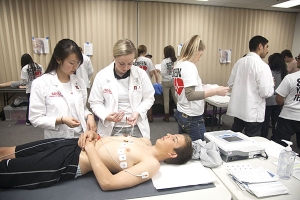
Fueled by anxiety and depression, bullying, sports, and feelings of inadequacy in an appearance-driven culture, eating disorders continue to rise among young people. Early intervention is key to successful treatment, but these life-threatening psychiatric conditions aren't always immediately obvious or associated with weight loss.
"It's such a quiet, insidious illness,” says Jennifer Walk, LPC, NCC, Family Living Institute. “An eating disorder can go on for a couple of years before friends, parents or teachers figure it out."
According to ANRED (Anorexia Nervosa and Related Eating Disorders), a non-profit online eating disorders resource, anorexia and bulimia primarily affect teens and young adults, but studies now find that children as young as six are suffering from the disorders.
The risks. Inadequate nutrition can result in stunted growth (especially during puberty), subpar athletic performance, and a lack of brain development, which hinders academic progress. A restrictive diet also puts kids at increased risk for fractures and bone breaks. If the child suffers from binge eating disorder, she may gain weight.
Awareness is key. Parents, teachers and coaches can help prevent eating disorders through awareness, avoiding mandatory weigh-ins and role modeling a healthy lifestyle.
"Coaches can be one of the biggest advocates in making sure kids stay healthy by reinforcing how important nutrition is to fuel your body to do the sport accurately and to prevent injuries," Walk says.
A genderless illness. Eating disorders are most prevalent among girls, but boys are also at risk. Following a difficult divorce with her son's father, *Mary Smith's 9-year-old son exhibited signs of an eating disorder marked by distressing nightmares about overeating and a fear of gaining weight. With guidance from her son's pediatrician and a counselor, Smith helped him feel less anxious about food.
"It was this assertion, this sense of order—mom knows best—that helped him feel the world was in control and he didn't need to try to control his world through food," she says.
Dieting's slippery slope. Accompanied by compliments and positive attention, weight loss can turn addictive.
"Most females start off with an 'innocent' diet to lose some weight, whereas many males desire to become more muscular and powerful, yet 'cut' like a bodybuilder, which is a tricky balance to achieve through nutrition and exercise," says Crystal Witte, RDN, Customized Nutrition Works.
Avoid discussing your child's weight or size or comparing her weight to her friends.
"The focus should always be on sustainable lifestyle choices that promote health, yet are realistic," Witte says. "Children and teens are still growing and developing, so body weight is not a reliable way to gauge health."
Promote open communication. Cyber-bullying and cruel remarks from peers about appearance can distort a child's self-image. Monitor your child's online activity and establish boundaries like powering off devices at bedtime. Talk and listen to your kids to remain aware of what is happening in their lives.
"People underestimate how serious eating disorders can really be," Walk says. "Some parents think it's just a phase. The longer the behaviors continue, the harder it is to stop."
Recognize Red Flags
- Secrecy around food
- Excessively looking in the mirror and stepping on the scale
- Withdrawal from friends
- Obsessing over nutrition research
- Excessive exercise, even when sick, tired or injured
- Lethargy
- Loss of menstrual cycle (among females)
- Inability to concentrate
- Self-harm like cutting of wrists or thighs
Common Eating Disorders
Anorexia nervosa - Self-starvation accompanied by severe weight loss. Has the highest mortality rate of any psychiatric disorder. Inadequate nutrition hinders brain development, stunts growth during puberty and increases the risk for fractures and bone breaks.
Bulimia nervosa - Overeating accompanied by purging behaviors like self-induced vomiting. Can cause inflammation of the esophagus, tooth decay and an electrolyte imbalance that can lead to heart failure.
Binge eating disorder - Overeating without purging behaviors.
Resources
National Eating Disorders: www.nationaleatingdisorders.org.
Anorexia Nervosa and Related Eating Disorders: www.ANRED.com
Freelance journalist Christa Melnyk Hines and her husband are the parents of two active boys.
*name changed for anonymity
Published 2017



















